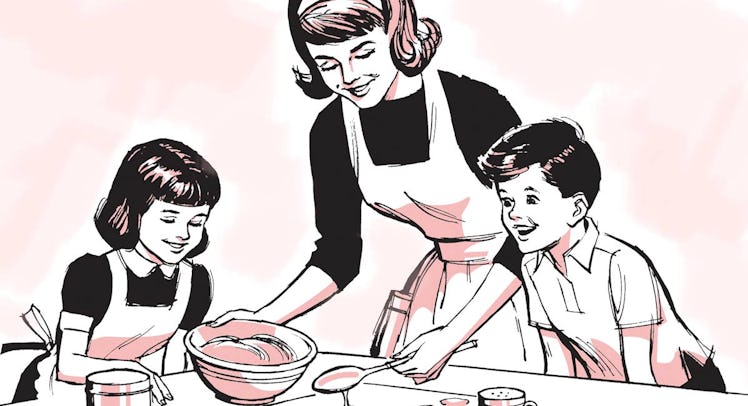Feel Like a Third (or Fourth) Wheel at Home? There’s a Reason for That.
"Maternal Gatekeeping" is real. That doesn't mean it's anyone's fault.

It’s one thing for dads to be jealous of fellow fathers who seemingly have it together: strutting down the street with their babe cooing and giggling on their shoulder, spouse engaging in lively banter with them that lacks the tired, droning “Whaddya want for dinner?” that might have become the tagline of your marriage-teetering-on-roommate relationship, baby wailing in the background.
But could what you’re actually jealous of here be the fact that your wife gets more hands-on time with your baby than you do?
Sarah Schoppe-Sullivan is a professor of psychology at The Ohio State University and says that it’s possible. Her research looking at father-child relationships suggests that “maternal gatekeeping” could explain why dads in heterosexual relationships often end up envying their kids or their wives or both. And it comes down to biology. Moms are more biologically attuned to their children than fathers, which often sets off a virtuous cycle (for the mom and the kid anyway) of attention and alone time. Dad ends up feeling viciously left out.
“It’s the reason why the father could feel left out of co-parenting or missing the relationship of being close with the child,” says Schoppe-Sullivan. “If the mother is really spending a lot of time with the child in a parent-child alliance, the other parent will feel excluded.”
Schoppe-Sullivan says it would be a mistake to think of this as a bad thing. It can be, sure, but it also represents an opportunity for what she calls “gate opening.” Schoppe-Sullivan says that once parents recognize that biological and social factors will likely create a mom-first situation, despite whatever feelings they have about sharing or responsibility, they can take steps to reorient the kid.
Still, for dads who are around less than moms, the solution will not create an equal and opposite relationship with the kid. Young kids’ spit-to-swallow ratios when being served food by a parent heavily favor mom and that’s doubly true if dad isn’t around much. There’s no amount of intensity that can turn that around. For really little kids, time together is time together. There’s no way to hack around bonding.
Given all that, Schoppe-Sullivan believes that the most successful co-parenting couples tend to be the ones where mom allows dad to specialize and facilitates a connection rather than making it redundant by offering the same experiences. “Sometimes, kids want security, so they go to their primary caregiver,” Schoppe-Sullivan says. “Other times, if they’re looking for adventure or want to play, they’ll go to the other parent.” Allowing dad (or mom in the case of stay-at-home fathering) to be that other parent works wonders. Games are good. Fun is good. Everybody is happy.
Naturally, there is some delicacy required in reaching equilibrium. Mom wants to play and dad wants to comfort. There will always be a sense of inequality, but once couples understand and accept that the best thing for their child is a balance of delineated but not defined roles, they tend to do well. “Don’t use the word ‘gatekeeping’!” Schoppe-Sullivan says with a laugh. “But talk about it and be direct.”
This may lead — and often does — to disputes about parenting style. That is not unusual and it’s not a bad thing. It’s best to get that stuff out in the open and good to have those conversations in the context of larger discussion about playing different but important roles for a kid. It’s critical that parents be consistent, but not that they consistently behave the same way. That’s neither possible nor desirable. What’s desirable is that dad feels like he has access and a job to do and that he respects what mom is putting out there.
The other thing to remember is this: Kids are wildly unpredictable. Because toddlers are growing and changing every single day they may prefer mom for weeks on end and then make a sudden dad pivot. When that happens, there’s little point in trying to suss out motivation. Is there a reason? Sure. Are you going to guess it? Probably not. This too shall pass. Co-parenting won’t.
“Parenting is a triadic relationship,” Schoppe-Sullivan, a parent herself, says with the knowing laugh of someone who knows.
This article was originally published on